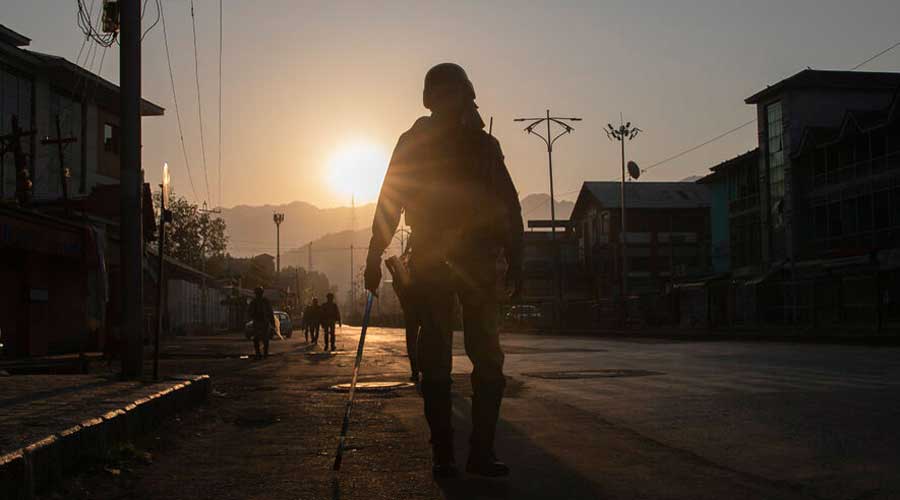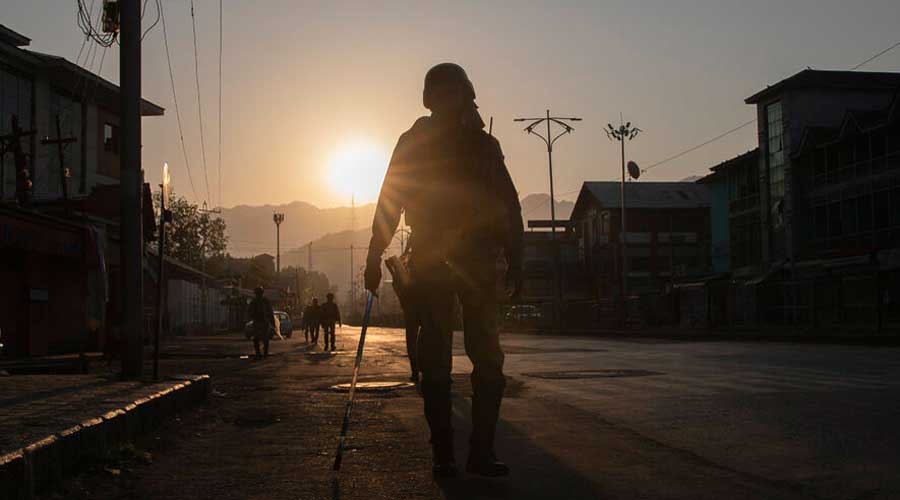The army admitted on Friday that “prima facie evidence” indicated that powers vested under an infamous indemnity law were “exceeded” when three young cousins were gunned down in Kashmir in June.
Disciplinary proceedings will be initiated, the army added.
The jargon-riddled admission is expected to bring the attention back on the Armed Forces Special Powers Act (AFSPA), which grants near-absolute immunity to security personnel in “disturbed area” as they cannot be prosecuted in civilian courts without central sanction, which is rarely granted.
In a statement on Friday, the army continued to describe the three youths as “unidentified terrorists” although it added that their “involvement with terrorism” was under police investigation.
Their families had said they were innocent civilians from Jammu’s Rajouri who had gone to Shopian in Kashmir in search of work. The father of one of the youths had said there were seven retired and serving soldiers in his family, including a Kargil war veteran.
“Killing innocent youth and show(ing) them as terrorists is most heinous crime and those involved should be charged for murder,” S.P. Vaid, former director-general of police in Jammu and Kashmir, tweeted on Friday.
The killing of the three cousins had triggered an uproar in Jammu and Kashmir and their families had been mounting pressure on the security forces to return the bodies so that they could be given a proper burial.
The defence spokesperson in Srinagar, Col Rajesh Kalia, said in the statement: “The evidence collected by the inquiry has prima facie indicated that the three unidentified terrorists killed in Op Amshipora were Imtiyaz Ahmed, Abrar Ahmed and Mohd Ibrar, who hailed from Rajouri.”
The spokesperson said the army had concluded its inquiry into the operation. “The inquiry has brought out certain prima facie evidence indicating that during the operation, powers vested under the AFSPA 1990 were exceeded and the dos and don’ts of the Chief of Army Staff (COAS) as approved by the Hon’ble Supreme Court have been contravened,” Kalia said in a written statement.
“Consequently, the competent disciplinary authority has directed to initiate disciplinary proceedings under the Army Act against those found prima-facie answerable.”
The statement did not clearly say whether the youths had been killed in a fake encounter or whether they were civilians. “Their DNA report is awaited. Their involvement with terrorism or related activities is under investigation by the police,” the statement said.
On July 18, the army’s 62 Rashtriya Rifles had claimed to have killed three “unidentified terrorists” near Amshipora village in south Kashmir’s Shopian district.
On August 10, three families in Jammu’s Rajouri had identified the three youths, from pictures circulating on social media, as their children who had been missing since travelling to Kashmir in search of work. The families had said the three were killed in a staged encounter after being falsely branded as terrorists.
Many drew attention to the jargon employed by the army in its statement on Friday.
“#AFSPA is not for killing innocent civilians under label of terrorists. What disciplinary proceedings under the Army Act? Amshipora encounter is cold-blooded murder of 3 innocent civilians of Rajouri. Don’t hush up DNA report. Rule of law must prevail, guilty punished for murder,” a journalist tweeted.
Jammu activist Guftar Ahmad, who has been spearheading the campaign for justice for the families, said they were feeling hopeful now.
“This has given us hope. The families are relieved. We are waiting for the DNA report after which we hope the bodies will be returned to their families for burial (in Rajouri),” Guftar told The Telegraph.
The three are buried in a graveyard at an unspecified location in Kashmir.
Guftar said the army had recorded the statements of five family members at an army installation in south Kashmir on Friday and promised that justice would be done.
“There will be a court martial. We came here (Kashmir) to record the statement. We were assured 110 per cent that ‘we (the army) will not let them (the accused) off’,” Guftar said.
Security forces personnel involved in such crimes are rarely punished in Kashmir thanks to the immunity they enjoy under the AFSPA. The army, however, is under pressure this time as the three men were from families with an army background.
Some politicians welcomed the army action but sought transparency in its dealings.
“The families of the three murdered men had continued to proclaim their innocence. Disciplinary action initiated by the army would suggest the army agrees with the families. The process must remain transparent & the guilty must face the full weight of the law,” National Conference leader and former chief minister Omar Abdullah tweeted.












